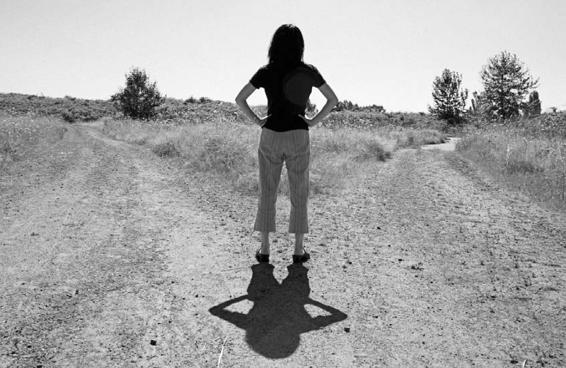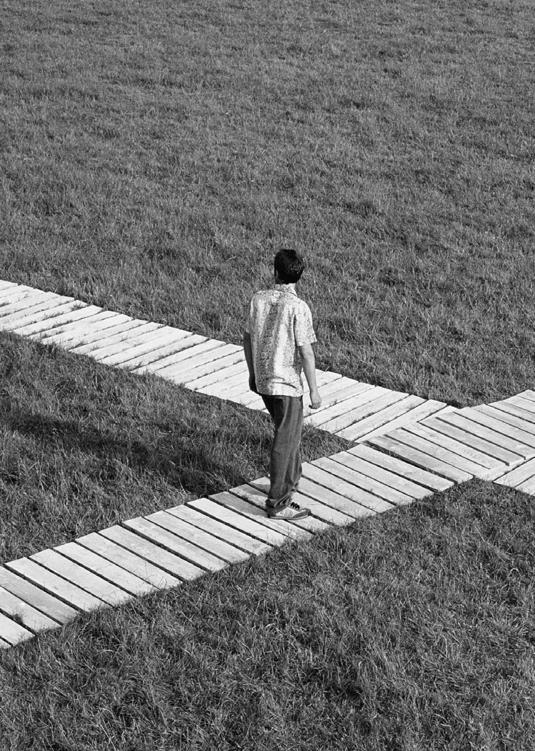What Now? (3 page)
Authors: Ann Patchett

broken oven, I had it all there, filed away in my memory.
? ? ? ? ? ? ? ? ? ?
It was for me the start of a lesson that I never stop having to learn: to pay attention to the things I’ll probably never need to know, to listen carefully to the people who look as if they have nothing to teach me, to see school as something that goes on everywhere, all the time, not just in libraries but in parking lots, in airports, in trees. One of the greatest lessons of my college education came in my junior year when I was lost in Chicago’s O’Hare airport. The airports of today bear no resemblance to the airports of twenty years ago, even the ones that are still in the same buildings. I think it would be almost 2 2
impossible to get lost in an airport now, since you aren’t allowed to go into any area for which you are not specifically ticketed. There was a time when people not only walked their loved ones to the gate but walked them onto the plane and sat beside them until it was time to take off. It was not uncommon for people to wander onto the wrong flights and fly to the wrong cities because no one was very diligent about checking tickets. I can remember many times when the flight atten-dant would close up the door to the plane and say, “We’re going to Dallas” and someone would pop up from their seat and say, “What do you mean, Dallas?” Of course, this was not what had happened to me. I had gotten lost long before I ever made it to a plane. I was still trying to find the right terminal. I walked back and forth with my heavy bag, sure I was 2 3

going to be late. I looked at my ticket. I looked at the signs. I walked back and forth some more. Finally, a young man came up to me and asked the question that anyone who was watching would have known the answer to.
“Are you lost?”
? ? ? ? ? ? ? ? ? ?
He was handsome, with straight,
streaky blond hair and a tan. He was maybe five years older than my twenty-year-old self. He had a handful of brochures, a nice smile. I told him I was probably only mis-placed.
He looked at my ticket and confirmed that I was a long way away from where I needed to be. “I know the airport,” he said.
“I’ll take you there.”
“But then you’ll be late for your flight.” I was sorry to point this out, seeing as how I was not the kind of girl who was walked to gates by handsome young men.
The pleasure and the novelty of the experience were something I’d be sorry to miss.
? ? ? ? ? ? ? ? ? ?
2 5
He shook his head and took my shoulder bag. “What’s in here?” he said, sagging beneath its weight. “Lead?”
“Actually, it’s zinc.” I had brought home several zinc plates to etch for my printmaking class and I was regretting having chosen quite so many. I asked him if he worked at the airport. He didn’t look like a guy who worked in the airport. He had on jeans and deck shoes and a dark pink shirt with the sleeves rolled back. He told me he worked there after a fashion: he was a Hare Krishna.
I stopped. Instantly, my good manners fell into combat with my paralyzing fear, fear and manners being two things I had been overburdened with in Catholic school. How did one speak to a Hare Krishna? What did 2 6


one say? “Thanks anyway,” I said in a weak voice. “I can find it.”
“Find what?”
“The gate. I remember where it is now.” Hare Krishnas very likely kidnapped girls like me. They brainwashed them into playing tambourines in public parks, made them dance in circles and chant repetitive songs. Thinking of this now it breaks my heart: once the most dangerous person at an airport was a lone Hare Krishna, trying to convert the world to the ways of love and vegetarianism, or that joining a religious sect meant you might have to play an undignified instrument like the tambourine.
He sighed and went on ahead. “Don’t be silly.”
I felt myself grow pale. He had my suitcase. I looked around at the bustling 2 9
throng and thought of how there was always safety in numbers. I would walk along with him a ways, not too close, and then I would make my escape. If I lost the bag, so be it. It was not a high price to pay.
“So now you’re not talking,” he said as we walked on and on. O’Hare is a huge airport and our destination seemed to be somewhere in Southern Illinois. “You don’t talk to Hare Krishnas?”
“It’s not that,” I said, but I couldn’t say exactly what it was. The truth is the opportu-nity to talk to a Hare Krishna had never presented itself to me. A few gates later I tried a more honest tack. “I thought you wore robes.”
“We do. But nobody talks to you when you wear the robes.” He stopped for a minute to readjust the bag full of my zinc plates, 3 0
which was digging into his shoulder. “All I want to do is talk to people.”
? ? ? ? ? ? ? ? ? ?
Of course he could have been trying to trick me, but if he wasn’t I had to admit the right to talk didn’t seem like so much to ask, and so I made a decision that was against my cautious nature. I decided to listen. I was lost, after all, and the Hare Krishna had found me. The least I could do was hear him out. When we finally reached the gate I discovered my plane was running two hours late, and so I listened for two hours while he told me what it was like to love God, to love God so much that you would gladly devote every minute of your life to Him, to be so moved by the enormity of His love and 3 1

goodness and grace that you wanted to tell other people about this wonderful thing you’d found so they could know it too. “Can you imagine what it’s like,” he said, “wanting to talk to a woman about love and having her scream at you to get away, or trying to talk to a man about God and having him bury his face in a
Time
magazine? It gets depressing after a while.”
“I would think so,” I said. It occurred to me that the Hare Krishna had probably been chosen for airport duty because without the robes he fit in so nicely. He had a soft voice and a pleasant manner. He had no doubt been voted the least likely to scare anyone away by his Hare Krishna class and still he failed at his task. But what all the people who had run from him would never know was that he was good company. We ate the 3 3
chocolate-covered almonds I had in my bag and we talked about God. It was the longest conversation I’d had on the subject since I’d graduated from Catholic school, and I can’t imagine it did me any harm. When my plane was finally ready to depart he gave me one of his pamphlets on being a vegetarian and shook my hand. He was a nice man, neither frightening nor mysterious; in fact, I would bet we had more in common than not. The difference was he had answered his own What now. Maybe not forever, but at least for a while.
? ? ? ? ? ? ? ? ? ?
The Hare Krishna didn’t convert me (though honestly, I don’t believe he had tried) but he did teach me something I 3 4
should have known all along: people need to talk, and often a willingness to sit and listen is the greatest kindness one person can offer to another. One of the first lessons of child-hood is to be wary of strangers, and while this is good counsel to guard against the world’s very small nefarious element, it also teaches us to block out the large majority of those who just have something on their mind they’d like to say. We are taught to be suspicious, especially of anyone who might not look like us or share our beliefs. By the time we reach adulthood, many have perfected the art of isolation, of being careful, of not listening in the name of safety. But the truth is that we need to hear other people, all people, especially in those moments when we don’t know exactly where we’re going ourselves. When it comes to finding our way 3 5


we’re better off taking in as much information from as many sources as possible. If someone told you he didn’t need to listen to other people anymore because frankly he had life all figured out, he had all the answers, every single one of them, and was crystal clear on every last question in the universe, what could you do with that person but shake your head in despair? Chances are, anyone who claims not to need the input of any other person on the planet is probably crazy. So if you were sure you didn’t have all the answers and were spending long afternoons asking yourself What now? wouldn’t it be even crazier not to listen to people or to make up your mind against them based on the most super-ficial bit of information, say a saffron robe, perhaps? For the most part wisdom comes in chips rather than blocks. You have to be 3 8
